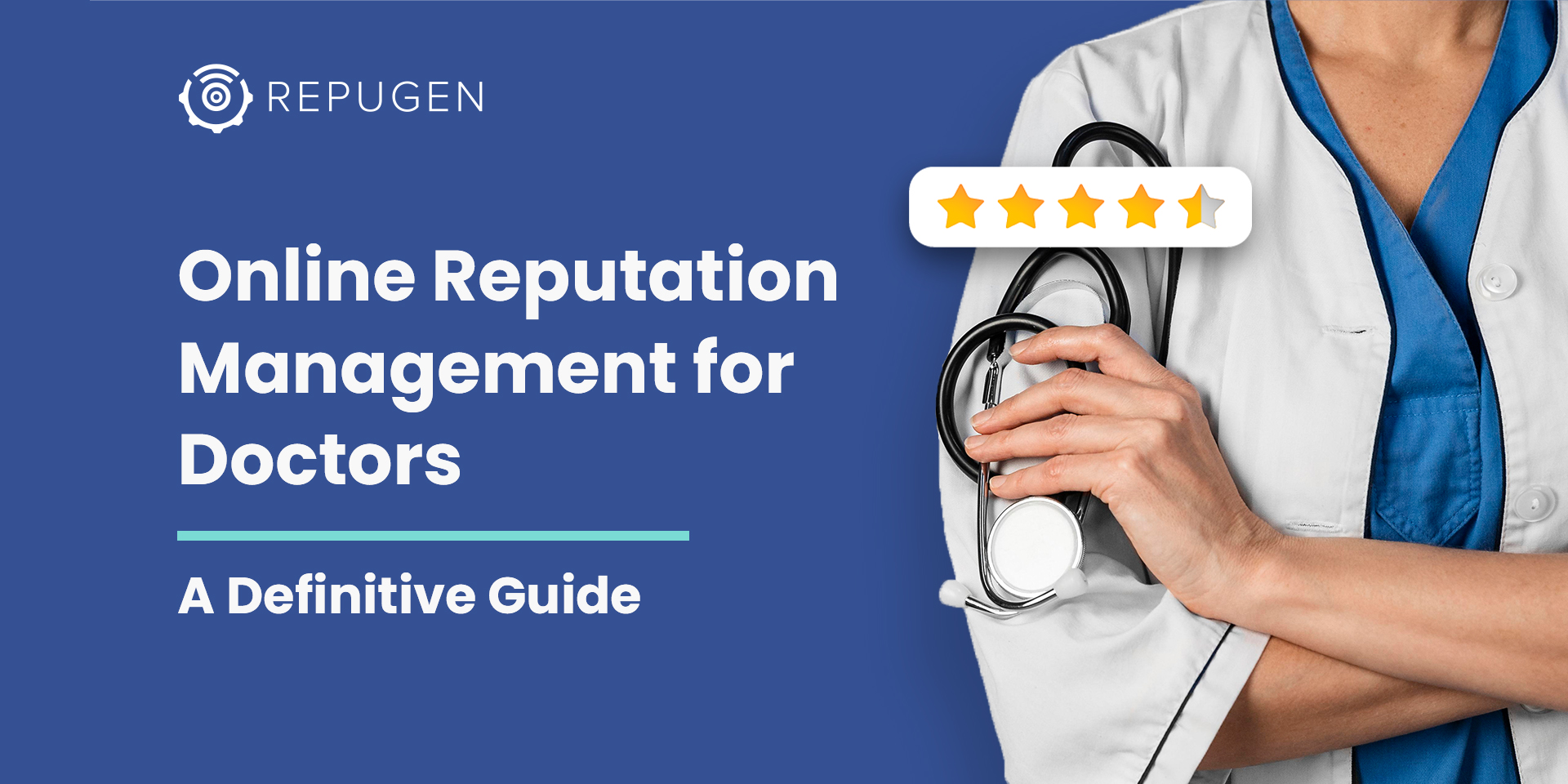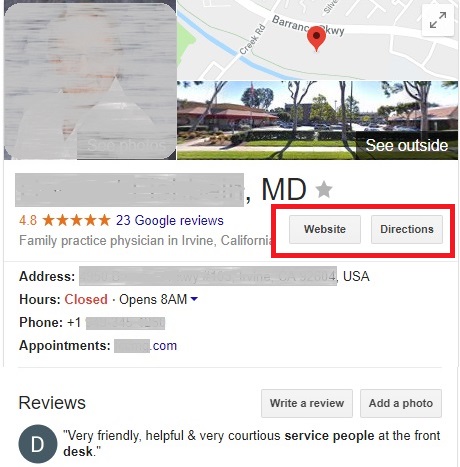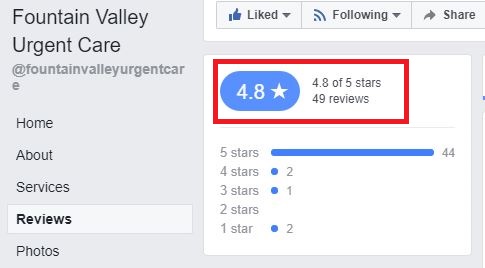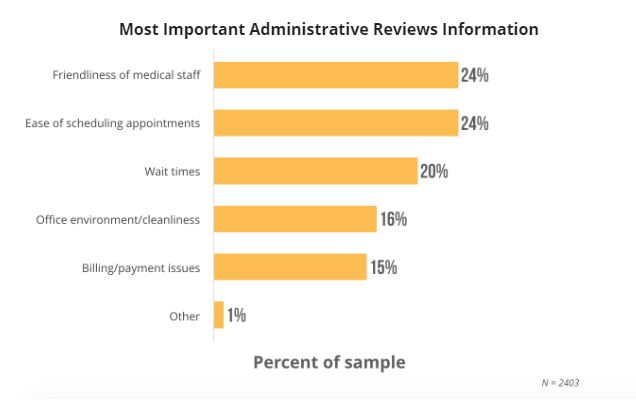
As patients are increasingly turning to search engines and review sites for evaluating the quality of care, it's time that doctors should also be there to provide the answers that patients are looking for. With a proactive reputation management, doctors can build a strong, transparent reputation that helps patients make informed decisions.
If you are a solo provider or part of an Independent Physician Association,this article will guide you step-by-step in developing and managing your online reputation.
The success of your healthcare practice depends on how positive a reputation it has with its patients.
If that’s the case, then how do you determine your reputation?
Referrals and word-of-mouth are still a well-known and common factors that relate to your reputation and patient acquisition, but then how many of your new patients rely on just these two factors to choose you? As a matter of fact, even after getting referred by their friends or family, or even by another physician, one of the first things that your patients will do is to research your or your practice and its reputation online to see what other patients are saying about you.
85% of (healthcare) consumers trust online reviews as much as personal recommendations. - BrightLocal
While displaying positive patient reviews can certainly help your practice influence opinions in your favor, it doesn't mean that reviews are all that matters for your practice's online reputation.
Users check, on an average, 12 different sources including content from review sites, social media, on-site testimonials, blogs, etc., before finally picking a provider. – Google
All this sum up into two things: first, many other factors (apart from reviews) are responsible for your online reputation. Second, reviews and testimonials form a major part of it. The process that takes care of all these is called online reputation management.
Related Blog: Why Doctors Should Pay Heed to Their Patient Reviews Online
“Online reputation management (ORM) is the practice of crafting strategies that shape or influence the public perception of an organization, individual or other entity on the Internet. It helps drive public opinion about a business and its products and services. – Techopedia
The definition encompasses almost every online marketing activity that directly or indirectly adds to the reputation of your practice and you.
So, in those terms... reputation management may involve utilizing your medical expertise to engage with your online patient community on Facebook to answer medical questions and concerns. Or, using the same expertise to provide relevant answers to your patients' health-related inquiries via content marketing, to establish yourself as an authority in the eyes of your audience and Google (by improving your search rankings).
However, as the term 'reputation' exhibits more about your patients' beliefs or opinions, it's arguable that in its core, ORM strategy deals more with taking control of the online conversation. That way, ORM may involve using Twitter or Yelp to jump in on conversations and tackle negative or defamatory comments about your practice.
Or, it could involve soliciting positive reviews from happy patients to improve the search engine rankings and the public-facing online reputation of your practice.
With online reputation management, you can ensure your personal reputation as a doctor is decently positioned (and represented) not only on review sites but on other important places like search results and social media timeline/feeds.
If you are interested to see how these are done, we will explain later in the article. Before that, you should introspect whether your practice really needs reputation management or not. For that, you'll need to self-assess your current online reputation.
How? Keep reading...
Have you ever Googled your practice or your provider's name to see how they appear in the search result?
If you haven’t, do it now! A stellar online reputation starts with a robust internet presence. After all, if you are not properly visible, how can anyone say anything about your reputation?
While you Google your practice, look for these in the search results: [Note: Try 'incognito' browser setting. It will ensure that the search results aren't influenced by the previous search activities on your desktop.]
Ideally, your website should appear as the first result for a direct search (someone directly entering your brand name) on Google.
If your site is well-optimized (with proper keywords), is well-indexed, isn't serving any penalty from Google, then it'll rightfully appear in the first result. Of all other content links in the search results, at least some should be the predominantly “owned” ones (i.e., those where you control the content).
For example, your blog page where your brand owns the content. Appearing with more predominantly “owned” links means a high reputation in the eyes of Google.
Google can fetch results from review sites too. Remember the review snippet in the search result.

If the review snippet appears, check for these:
To appear with review snippets from different platforms, your review profiles will need to be well-optimized for local online presence. For a high reputation, they'll also need to be mostly positive.
Appearing in the Google Knowledge Graph means you have a high online presence and reputation. The Knowledge Graph sums up the most useful information about your practice such as your picture, the map, the business address, telephone number, patient reviews, etc., all in one place.

However, appearing in the Knowledge Graph requires a well-optimized site and proper online listings of your practice on different third-party online directories, including Google My Business.
[Read: Everything about online business listing and its relation with patient experience]
Note: Google Knowledge Graph is the box that appears to the right of the search results and that contains information such as a map, the business address, telephone number, and also Google reviews.
Tip: Search differently as patients will do. It means replacing related words around the keyword.
For example, substituting “Dr. ABC Neurologist” or “Dr. ABC McArthur Boulevard” for “Dr. ABC, MD” will expand the search results. Search results for all these terms will slightly differ, and ideally, for all these terms, you should appear decently parallel to make sure that your reputation is on terms with related keywords.
While search engine reputation matters the most, social media reputation is no less important.
That's why you'll need to assess your social media reputation as well.
One of the best ways to assess your reputation on social media is by manually checking your social media profile pages and comparing them with your competitors. If you have been visiting your social media pages daily, you should already be aware of the situation.
However, if your profiles are being handled by a social media marketing person or your practice manager, it's time you make the assessment right now.
Facebook is the most important platform as it's a highly sociable place where you get to learn from your patients' perspectives. For learning about your reputation with other stakeholders, such as referring physicians, pharma people, and medical industry influencers, Twitter and LinkedIn are the best.
For now, stick with Facebook, as that's the place where you directly get to interact with your patients online.
Also, in terms of monthly user traffic, Facebook is already the highest review generating site with 47% of its surveyed users having written a review in the last year.
Review frequency: It's important that your profile page should be inviting feedback regularly to maintain engagement and transparency. An outdated database of reviews doesn't help patients in their decision making. Also, regular reviews help in increasing engagement and keeping up with the algorithmic actions on your profile.
Review quality: The aggregate star rating (check the screenshot below) given by Facebook will give you a fair picture of your reputation there.

However, you should also get a closer look at the content of the reviews, especially the negative ones with less star ratings. That will help you understand the factors that are causing a bad reputation among your patients.
Review responses: Also, check how your reviews are being handled from your practice's end. If you find that reviews, especially the negative ones, aren't being handled carefully and tactfully, it means you need a reputation management team dedicated for the job.
Engagement & interaction: Check for how the posts on your Facebook profile page are performing. Are they getting a sufficient number of responses in terms of likes, comments, and shares? You should check the quality of those comments too. That's because these metrics can indirectly affect the frequency and quality of your reviews.
With these informative steps, you should be able to get an idea of where your current online reputation stands. If it needs improvement, don’t hesitate to make the changes necessary to optimize your practice’s reputation.
How your patients will review your practice depends on how they feel during their visit. This means that to improve your online reputation, you'll have to start with improving patient experience at the practice level, then utilizing positive patient experiences to build a positive reputation on the web.
How do you build a great physician's reputation? Read on to find out.
According to a 2016 survey on how patients use online reviews, 30% of patients who could be writing reviews aren't writing.
This could be due to the absence of an automated review generation process. However, even in the presence of an automated system, many doctors complain about receiving only a few reviews.
In many cases where practices send their patients a link to publish a review, they still didn't get a response. That's because you need to ensure you’re getting patients soon after their visit, when their experience is still fresh. If you really want your patients to leave a review, encourage all patients to share their experience, regardless of the nature of their visit.
One way you can do this is by engaging patients in a conversation and then asking them for a review. Doing so will improve the chances of your patients writing reviews for you.
Here's how you can engage your patients in a conversation before asking them to write a review:
Related Post: How you can actually convince your patients to write reviews.
As you start collecting patient reviews, you'll start receiving some negative reviews too. Don't worry, as a few negative reviews are good for you as they present a more balanced reputation online.
Also, when tracked proactively, negative reviews provide the opportunity to build and nurture a long-lasting relationship with your patients.
RepuGen allows you to identify your unhappy patients right after their visit, and while also providing them the opportunity to leave a public review at any time. The process of identifying unhappy patients and performing service recovery is simple. It goes like this:
Timing is very important during this entire process.
Related Post: How to Address Negative Patient Reviews to Improve Service Recovery.
People seeing your patients' reviews online will also expect to see your responses to them. This way they get to learn about your attentiveness towards addressing your patients' concerns and how you tackle your patients' issues with your care or service.
According to a Software Advice survey, 65% of patients feel it's “very” or “moderately” important for doctors to post a response. Keeping professional courtesy, refraining from disclosing the patient’s identity, and addressing to the masses instead of the specific patient is the key to being objective in your responses.
Here are the guidelines on how you should respond to positive and negative reviews:
a. Responding to positive reviews from your patients
Create an uplifting, professional response that shows your commitment to patient satisfaction.
Don't write anything that could reveal or confirm the patient's identity, to prevent yourself from violating HIPAA. Also, negative or positive, never forget to show your appreciation by always thanking your patients for sharing their feedback.
A piece of advice here: Keep distance from phrases like, "It was great to see you", or "Thank you for visiting the office". Try something that's more vague and positive such as, "Thank you for the kind words". Doing so will reduce the chances of confirming the identity of a patient.
b. Responding to negative reviews from patients
Before taking any action with a negative review, address it objectively. Examine the situation from all perspectives; the patient's point of view, a legal point of view, and the public's point of view. Then, create a professional response that can minimize the damage to your reputation while respecting confidentiality laws.
Also, if you think that a review is falsified or inappropriate, you can report or flag it; asking the review site to take it down.
The review site should comply – so long you can provide a credible argument. However, before reporting, learn about the guidelines laid out by each review site. It will help you to be more objective with your request, improving the chances that the review site will comply with your request.
Patients leave reviews about your entire practice; not just about the quality of healthcare you provide. It's just the same when patients are reading reviews.
According to a survey, 84% of patients look for information such as staff friendliness, ease of scheduling appointments, wait times, and office cleanliness/environment, etc., over other obvious details while reading reviews. 
This calls for training every staff member in customer service best practices and making it a company policy to follow these practices closely.
From phone calls, front desk conversations and nurse interactions, to other things such as car parking, wait times, etc., all should be handled with friendly and professional behavior. Here, you can take help from the sentiment analysis feature in RepuGen.
Sentiment analysis of your patients will help you understand what precisely bothers your patients, which will allow you to implement the required changes to your practice more effectively.
Related Post: Patients Value Personal Interactions with Their Providers: An Analysis of 7M Reviews Confirms
While patients are increasingly using social media for healthcare information, doctors are still reluctant about it. The reasons could be the fear of violating ethical and legal regulations, and the possibility of a misstatement getting shares on social media.
Contrary to all that, having a social media presence is vital for your practice's growth in this digital age. Marjorie Stiegler, MD, a Harvard trained physician, and a healthcare social media strategist provides these reasons for having a social media presence:
On the point of reluctance in using social media, Marjorie says, “sharing your ideas with as many people who might possibly benefit (even if that is by challenging you or taking another view) is a good thing.
Disseminating knowledge and advancing science are core reasons we publish in journals. Even the best academic journals have a ridiculously low readership compared to the web.” To learn more about what Marjorie suggests for managing your professional reputation on social media, read her complete article on the topic.
Healthcare content marketing is another way to build a robust online presence and reputation. Not only does it help you win valuable organic search traffic, but it also gives you a chance to establish yourself as a thought-leader with your 'expert articles' on related medical issues.
According to Pew Research, 1 in 3 patients use the internet for resolving medical issues.
A Google research says that, on average, patients go through 12 different online resources before finally picking a provider.
All of these explain the reason why you should be investing your time and resources in content marketing. Publishing useful content – even just one post per month – can go a long way in garnering appreciation from readers and giving you an effective means of selling your expertise without being overtly ‘sales-y’.
The above-given doctor reputation management strategies can help you in elevating your image online. However, while implementing these, you should always refrain from some practices that may prove to be harmful to your healthcare business.
Let's check out some 'Don'ts' of online reputation management for doctors:
Now that patients' decision-making has shifted online, you should also focus on elevating your reputation on the web, so that you can positively influence prospective patients in your favor. While doing so, you can take help from a reputation management company that will provide you with a seamless process to ensure that managing your reputation isn’t overwhelming.
RepuGen has helped many healthcare providers and practices elevate their online presence with a stellar reputation management service. You can call us at 866-246-7891 for a free consultation or schedule a free demo of our reputation management tool.
0 Comment
Your email address will not be published. Required fields are marked *